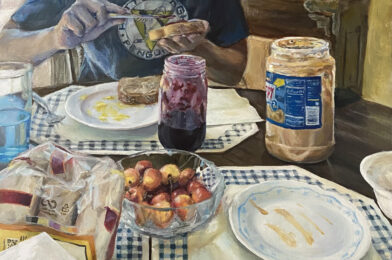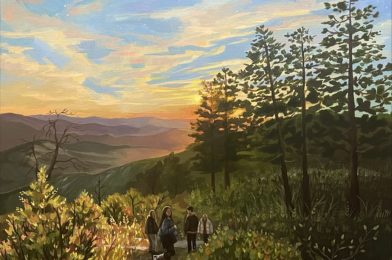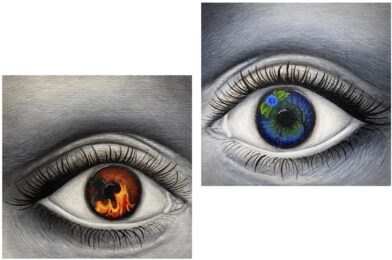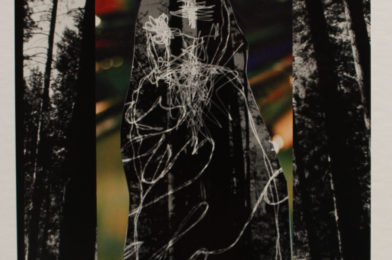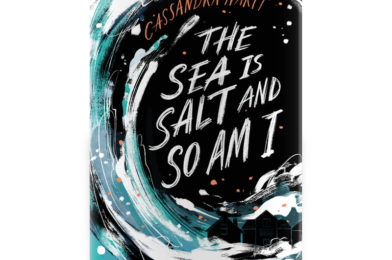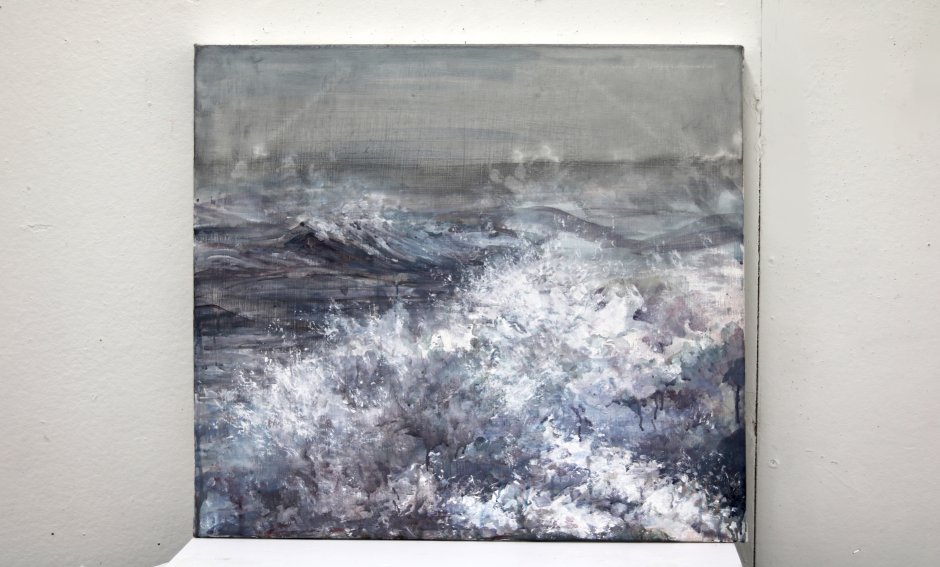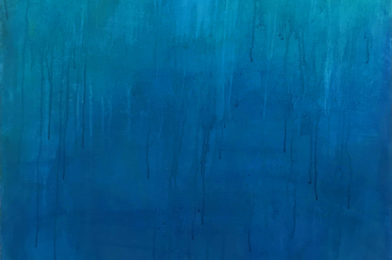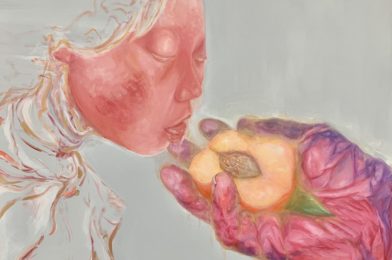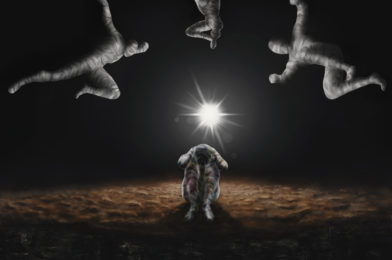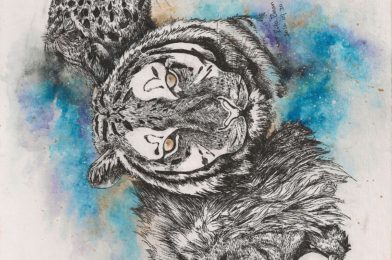I am born into the world screaming, my breaths stuttering against the blankets that swaddle me. The air around me stenches of subdued hope, warm fingertips weigh down my eyelids and there is the soft feeling of lips against my blushing cheeks.
“有一天她会让我们感到自豪,” whispers a voice. She will make us proud one day. My grandpa’s words are slow and deliberate.
I am born into the world with hope on my shoulders, an anchor of love on my chest.
—
At five years old, I taste brilliance for the first time. I’m standing, my tiny legs wobbling, on top of the dark oak chairs and watching with unmasked glee as my grandpa kneads the dough carefully, his old and cracked palms expertly maneuvering them into perfectly round circles caked in flour. The sunlight pouring through the windows makes every grain twinkle like freshly fallen snow.
“What are you making?” I ask.
“Baozi,” is my grandpa’s quiet reply. Steamed meat buns. His eyes are focused, his hands gentle yet purposeful as he presses expert fingers against the dough.
“爷爷,” I whisper, my voice tight with awe, “Can you teach me?” My grandpa laughs, pausing for a moment to dust his hands on his apron. The apron itself resembles an American flag in some way – blue stars, pale red, and white stripes. I remember that I didn’t like it — that it didn’t fit him and the gentle curve of his smile, and the blue was an ugly contrast to his baby blue irises.
“Come here,” he instructs. With strong fingers, he gently wraps my small hands around the rolling pin and teaches me how to roll the dough. The dough sticks, devastatingly, to the rolling pin each time I attempt to slide it across the board. A pout forms on my lips — even then, I didn’t like the feeling of failure. But he didn’t quite mind, and I found that I didn’t either. He’d just laugh, shake his head, and extract the rolling pin from my hands.
“Here, like this.” And he shows me, step by step, how to get them into perfect circles and how to scoop in the filling, savory pork filling with chives and other vegetables. The baozi began to really take shape then, circular dough wrapped around small balls of filling into a plump onion shape. It smells of hearty oils and the sharp tang of cooked scallions.
“This is where the magic happens,” he whispers. The baozi are placed into baskets, stacked one on top of the other in a never-ending toppling tower of golden meat.
Twenty minutes later, there’s a fluffy and hefty bun in each hand, and I giggle with glee as I watch the steam curl from the tops of the puckered lips of the buns. They shine, brilliantly, like gold to me. The bun itself has always been my favorite part — the beautiful off-white color, the spring of the dough, and the chewy gummy feeling as I pull at it with my teeth. The filling is warm and it sits comfortably in my stomach, steeping with warmth and love.
My grandpa holds a bun in his palms, offering it to me with a fond smile. “What do you think?” he asks in broken English.
“I’m happy I can eat all this yummy Chinese food,” I say, honest in the way five-year-olds are.
My grandpa laughs, a loud ringing sound. “I’ll bring you to China with me one day soon, and you can get a taste of the real deal.” I want to tell him that this is the real deal, that being here, eating his buns so filled with love, is all I’ll ever need.
But I go to sleep that night dreaming of sparkling aqua seas and a country filled with people that look like me. I dream of a place that smells like home.
—
At six I venture across the seas for the first time, staring in wonder at the towering colorful arches that welcome me with blazing smiles. My grandpa holds my hand as we twist through the marketplaces, the words falling from his lips light like they have wings. He tells me stories of his youth in his low rumbling voice, pointing out small flashes of memories from his childhood.
He takes me to a baozi house, his eyes alight with glee as stacks of golden buns are placed before us, washing our faces with curling steam. “This is what authentic baozi tastes like,” he gushes around a mouthful of glistening meat. I smile at him, swallowing my own bite. The flavor of it lingers on my tongue, rich and sweet.
I want to tell him that his buns are even sweeter, that these buns are delicious but they’re lacking something. Something like love.
I can’t help but think as we pass through the bustling streets, watching him so alive, filled with youth and his eyes blazing with the type of belonging you only feel when you return home, your true home, for a long time. I can’t help but think that he’s so much happier here, where his words flow freely from his lips, unobstructed by the constraints of the English language. I realize then, that he has no real reason to struggle daily, testing unfamiliar vowels against his tongue. No real reason, except to be able to talk to me in both Chinese and English.
We return to the Americas and it feels like I’m supposed to have found something, but I only feel more lost, losing my grasp on strings that won’t untangle themselves.
—
At seven I learn to blend in, learn to swallow my tongue, and let my words fall silently against the soaking earth.
As we crowd together on the playground, a girl turns towards me, her mouth opening and it’s clear she has a question as her eyes drag over my features. “Why are your eyes so small?” she asks finally, and everyone around us grows silent. She stares at me, expectant and a little impatient. There’s a null rushing noise in my ears as I curl into myself. I stare back, at her hands, pale as milk, soft and pretty. I look down at my own, tainted yellow. My voice dies in my throat and I’m speechless.
A teacher yells something, and the buzz of the playground slowly resumes like nothing had happened. The girl turns away from me, boredom flashing in her eyes and a scowl on her lips. I stay paralyzed where I stand, still staring at my hands.
For the first time, I am ashamed. For the first time, I am overcome with a bitter longing to be someone else. Someone with golden hair and stars in their eyes, someone who fits in. The children loop their arms around mine and my feet drag against the blacktop, carving a threaded line on the loosely packed clay soils. It makes more of a mark than I ever will.
—
At eight, my mother asks me when my skin had become so dark.“No daughter of mine should have this tan,” she says, poking at my arm. “You need to be more conscious of yourself and how you present yourself.”
“I’m sorry,” I whisper. My words are lost, falling against deafened ears. I stare at my hands again, at my nails bitten down to their beds, and wonder when I had become so flawed.
And so – I become so very conscious, my eyes lingering on smooth expanses of pale pale skin, of bright doe eyes and golden hair. Like this, the cycle starts. Like this, I feel myself distancing myself from my culture, throwing away bits of myself until I can barely recognize the girl that stares back at me in mirrors and shiny reflective surfaces. I begin to lose myself in this game of imitation, of pretending until I can almost believe that I’ve become what I crave to be.
I lose sight of the sun, and I lose myself in this game of make-believe.
—
At nine, my grandpa asks me when I had lost my happiness. “You don’t speak to me anymore. Your eyes are sad, always. Why?” He asks the question in his slow, broken English, staring at me with a face so filled with expectations and hope. Bitter annoyance claws up my throat and I turn away. Part of me wants to scream, to tell him to just speak Chinese, to stop torturing himself to speak English just for me.
The other part of me freezes when I realize that even if he did, I wouldn’t be able to understand his words now. The Chinese language, the one that had graced my tongue so easily before…it escapes from me now like trickling water through the cracks of my hands. The realization hits like ice water to a stinging wound, and I say nothing and try not to break as the sound of his slow footsteps eventually fades.
That night, my grandpa makes me baozi. I turn him down and tell him that the filling has staled in my mouth after years of the same taste, and close my eyes so that I don’t have to see the crestfallen expression on his face.
I tell myself that I’m unlovable.
—
At ten, it leaves me – finally, and fully. The language that used to taste like saccharine tangerines and warm soaking honey on my tongue burns like acid on my lips now, foreign and laced with unfamiliarity. It rings loud and ugly in my ears, and I tell myself that this isn’t what it’s supposed to sound like. This isn’t the beauty of the language that burns me now from within. So I close my lips and vow to never speak it again.
The language dies fully then, hidden in the depths of a treasure chest that I had long since lost the key of.
—
At eleven, I feel like I’ve failed my identity, lost every bit of what had made me human, had made me unique. I float helplessly, without an anchor to tie me down, without anyone to tell me who I am or who I should become, or who I was. This is the story of someone who lets go too easily, I realize.
I want to learn to love again, want to learn how to piece myself together again and hug myself tight so that I am whole.
I want to try again, but a hissing voice inside of me tells me that it is far too late, that I’ve abandoned myself for too long, let myself lose too much – I listen to the voice, and I sink like this.
—
At thirteen, I leave. Leave home, abandon all that I have ever known, and cross the threshold to the grand halls of a new home – boarding school.
Maybe this is my chance, I think as the acceptance letter wrinkles in my hands. The “Congratulations” is printed in bold at the top and it feels like hope, it feels like finality and a new beginning all at once. I tell myself that this is my chance to find myself, I allow myself to lose my grounding in reality for a moment and dream in the stars again.
So I leave, expectations crushing on my chest and my breath caught in my throat and for the first time, I see so many people that look like me, gorgeous people with long black hair and glowing olive skin, smiling and laughing with their families as they bid them goodbye.
It is here that my eyes open to the beautiful diversity of human life – people from every corner of the globe, all together here within the same buildings, eating the same food, sharing their own pieces of themselves with each other, and keeping bits of others with them too.
I meet people that come from across the seas, from the country that I hadn’t stepped foot in since I was six years old. Their voices are filled with joy as they speak in their mother tongue, their words so beautiful that it aches, that the chest that I had locked so deeply inside of me fills again with longing and threatens to burst open.
They ask me if I know any Chinese, tell me that they’d love to have someone to speak with, stare at me with hope and familiarity that I don’t deserve. I shake my head no, and they never ask again.
It’s easier, too, to lose contact with my family. To pretend that I haven’t seen their calls, to tell them that I’m busy and stressed, and—eventually though, everyone finds themselves drawn back to their roots, to the place that is home. I give in, weak and lonely and aching for familiarity.
“You’ve never tried to call us,” my mother hisses. It’s the first time in three months that I’ve tried reaching out.
“I’m coming home soon,” I say simply. The exhaustion envelops me like a sprawling weight and I let it seep into my words, let my voice waver for a moment before I’m silent. I stare at the stroked paintings behind my mother’s pixelated features, at the swans and pastel bridges and fading mountains that are so often captured in Chinese paintings. Longing fills my chest, coats my lungs, and twists bitterly in my gut and I turn away. I’d lost the right to feel like this, to want like this, long ago when I had let my own language die in my throat three years ago.
“Your grandpa misses you,” my mother says after a moment. I look up, staring at her through the screen. The overwhelming guilt washes over me like crashing salt waves and I duck my head, unable to maintain eye contact.
“Is he well?” I ask finally. And there, in that moment, something gives in my mother’s eyes – a small flicker of sadness, and fear overtakes me until I feel like a string about to snap.
“He’s-he’s starting to forget things.”
That night, I stare at the ceiling with her words ramming against my skull over and over again.
“Come home soon, before he forgets you entirely.”
—
At thirteen, I learn what it’s like to be afraid of your own family. Of being afraid of those you love, of the terror that fills me when I step foot on ground that is unfamiliar and too familiar all at once. To be afraid of your own roots, to press your hands against your abdomen and clutch blindly at the chest that’s still there after so many years, its lid begging to be freed and filled with scraping cobwebs and the burning taste of shame.
I see him when I step off the boat. I see the way his features alight when he catches sight of me, the wrinkles on his cheeks drawing tight into a small smile. For a moment we stand there, the flurry of winter’s first snow gently swirling around our figures. For a moment I am paralyzed by a potent fear of rejection, of being unloved. We stare at each other, so many unspoken words between us but suddenly I’m rendered speechless, my mouth open but only silence coming out.
“You’re back,” he says finally. “How are you?” My heart aches at the familiar voice, filled with endearment. I glance up at him, at his oh so familiar blue irises, the kindness and patience that has always lived there — and the English sounds so wrong now from his lips, not when I’ve seen the joy of the man with feathered words flying from his lips, surrounded by choruses of vendors and the smell of chili oil hitting black coals. The cold seeps through the warm padding of my winter coat but in this moment—
At this moment, everything is clear. The chest opens on its own, blushing and beautiful and I feel…whole again.
I reach forwards and embrace him. ”爷爷,” I whisper. “我想吃包子.” I want to eat baozi.
Isabella Wu is a junior at Choate Rosemary Hall who loves to read novels, write short stories and poems, create art, and play music. In her writing, she aims to authentically convey her experiences and connect with readers through themes such as identity, love, regret, joy and more. Her work has been recognized by several National Gold Medals and the American Voices Award by Scholastic Art and Writing.
Visual art by Sofia Montelibano

